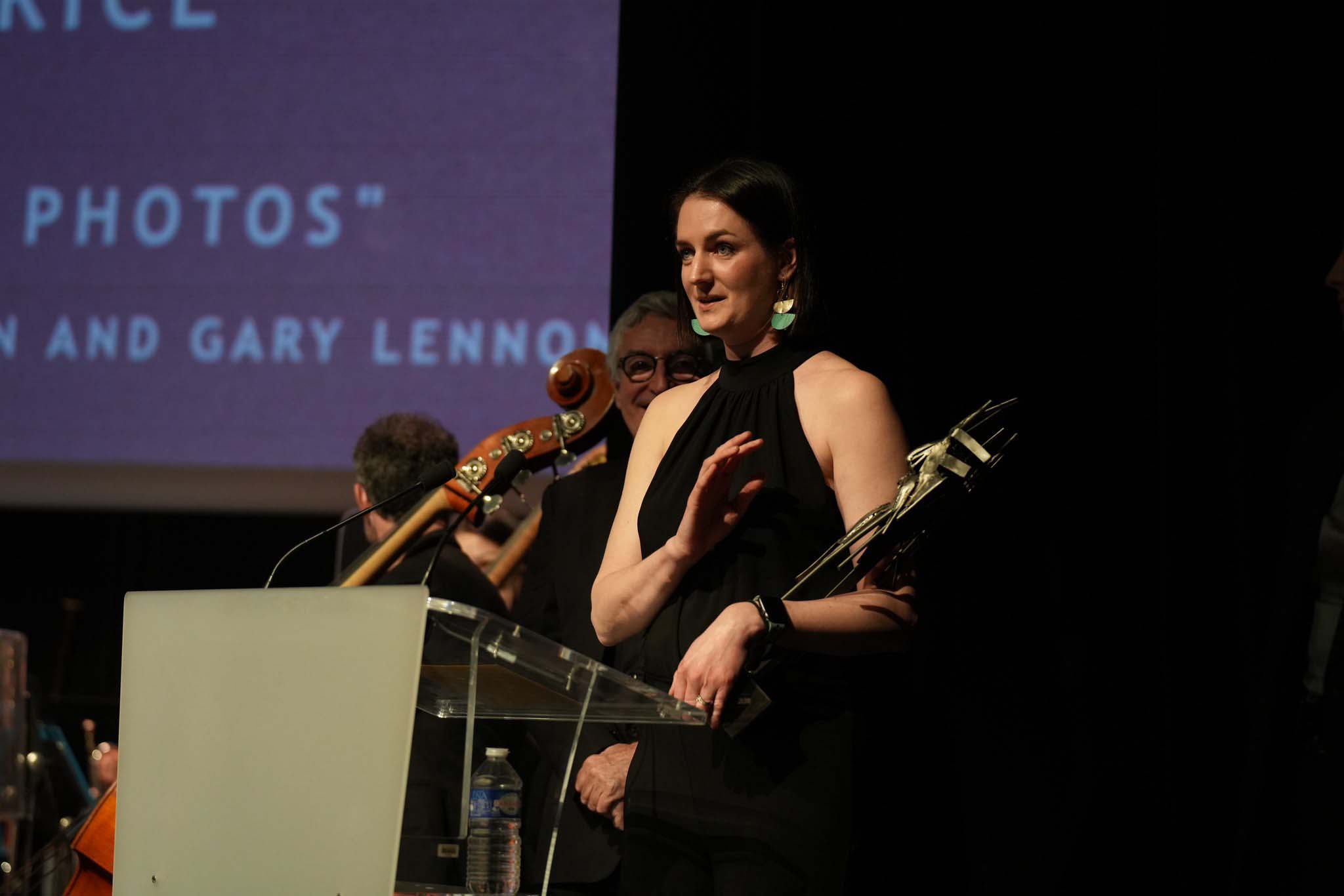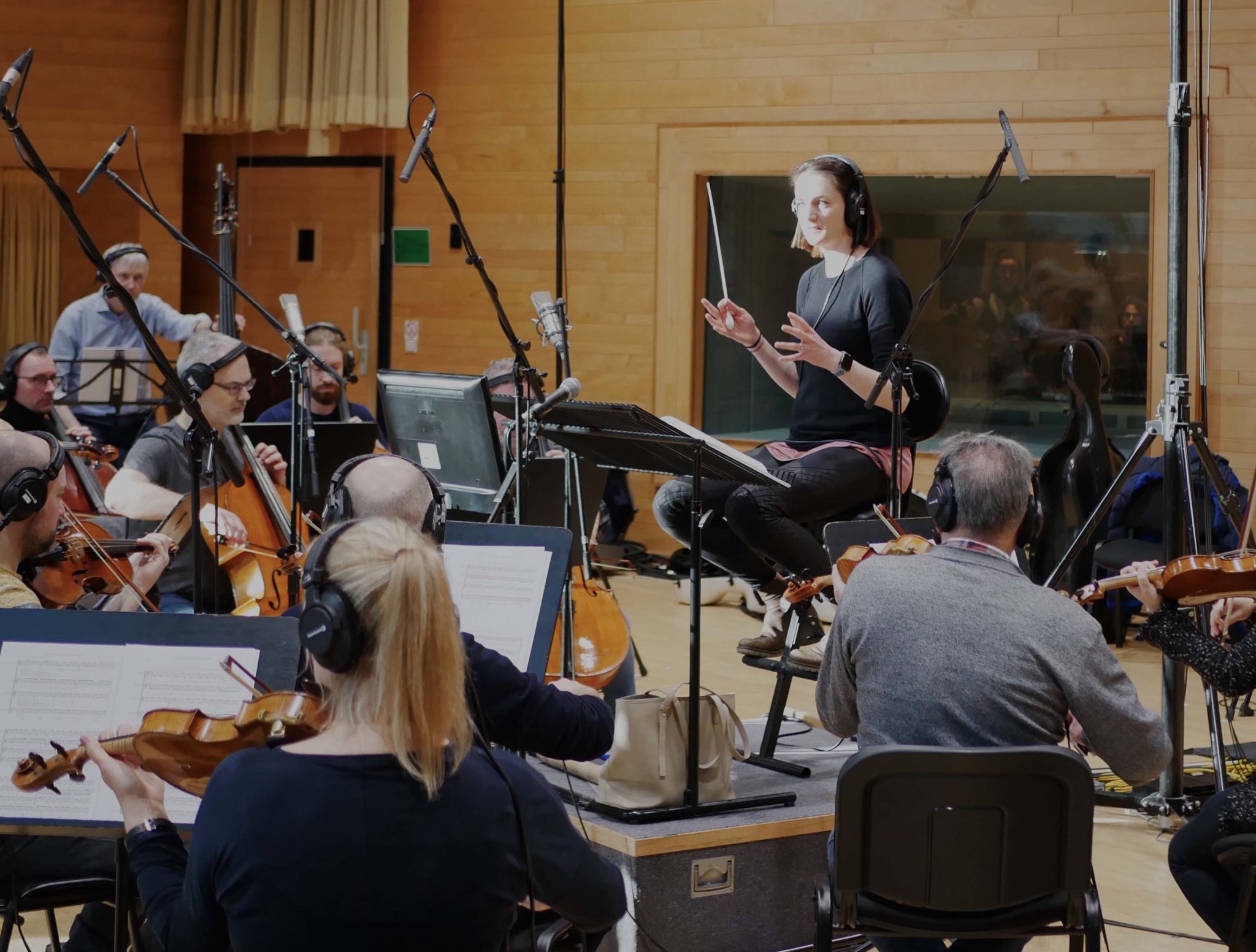- Music
- 07 Jan 25
Anna Rice on winning the Camille Award: "When my name was announced, my Apple watch went up to 133 beats-per-minute heart rate, and it asked me, ‘Are you out for a run?’"

Anna Rice discusses winning a prestigious prize at the European Film Composer Awards, for her work on Gary Lennon’s powerful documentary I Dream In Photos.
November saw Irish musician Anna Rice win a prestigious prize at the European Film Composer Awards, emerging victorious in the Documentary category for her work on Gary Lennon’s I Dream In Photos. The film explores the life and work of Pulitzer-winning photo-journalist Cathal McNaughton, who quit his job at the peak of his career aged just 40. As chief photographer for Reuters in India, McNaughton travelled extensively in Asia, covering stories of world importance.
However, the photographer struggled with the often harrowing nature of the subject matter, while his obsession with work drove him away from his family. Thus, in the film, we now find him living a monastic life in Cushendall, Antrim, where he doesn’t so much as own a camera. When it came to winning the Camille Award, Rice says its magnitude only fully hit home when she arrived in Paris for the ceremony.
“I didn’t think beyond getting on the plane,” says the Wicklow-based composer. “When I got off the plane, it did hit me how weird and wonderful it was. When my name was announced, my Apple watch went up to 133 beats-per-minute heart rate, and it asked me, ‘Are you out for a run?’ I said ‘No’ and went up and made the speech. Then the speech gave me the high resting heart beat warning, cos it was 144 beats per minute. So it was a huge surprise to me, and just really fun.”
 Anna Rice accepting the Camille Award in Paris
Anna Rice accepting the Camille Award in ParisWhen she was first approached to work on I Dream In Photos, Rice says she was hugely impressed by the early versions of the film.
“I saw a couple of rough cuts,” she explains. “Gary had been in touch years ago, although I hadn’t worked with him before. Everything he sent looked amazing, just extremely cinematic. With every picture, you can’t look away. I saw a lot of photos that didn’t make the final cut, but there was something about the final edit where I was so impressed, particularly with the pacing. I loved that there weren’t any overly smooth transitions, presenting it in a melodramatic way. It arrests your soul, was the way I put it a couple of weeks ago.
“The way Cathal spoke about his work, he was addicted to the adrenaline. Each situation has to be a one-up on the last, for him to get excited about the thrill of the danger he was in. It started to numb him, and he was in this position without coming home to any counselling or therapy. I think there’s a line where he talks about one of his colleagues seeing far more dead bodies than he has – so why should he worry about his mental health? So Cathal ended up walking away age 40, having won the Pulitzer. The film is a very honest look at the stage he was at in his life.
How did Anna approach the score for the film?
“In terms of the music, he was addicted to the adrenaline,” she reflects. “But there was only one or two spots where the music buys into that. When Gary and myself talked at the beginning, what we wanted to do was just soak the music in a brokenness and a feeling of fragility. We somehow wanted to achieve a fragmentation of sound – this wasn’t someone who had it all together. This was someone who had seen the most heartbreaking things on Earth that humans have done to each other. I felt like the score just had to feel lost for words – it was presented in a very raw way.”
For war reporters and photo-journalists, there is often an additional layer of complication in their feelings about their work. Many struggle with the idea of whether they’re helping to resolve a situation, or if they’re just acting as a neutral observer.
“Cathal does talk about about how you detach from it,” says Rice. “He describes how you’re onto the next day and you have no idea what that’s going to throw at you. You’re sending your pictures back to your editor, and you’re trying to just recover enough to be able to move onto the next cycle. He says it’s the government’s responsibility to fix these situations – he gets to be there and walk away. He gets to go home to a safe place and he’s a transient visitor.
“But it’s his eyes that are opening ours. Since we did the score, I’m so much more aware and thoughtful about the situations where journalists aren’t allowed in. Watching the news, I think about the film nearly every day.”

In terms of her general approach to her work, meanwhile, Rice says it depends on the filmmaker’s creative style.
“It definitely varies from director to director,” she says. “I’ve seen myself as a filmmaker only now in the last 10 years, and I’ve actually been doing it twice as long. Previously I would have come with my ideas before soaking in the film. Now, I will soak in the filmmaker’s company, and soak in the film, and try not even to think too much. But also, it’s a film composer’s job to collaborate. You’re joining a team who have been doing something for years, people have been working on that project for so long, and we’re often the last to come onboard.
“So while it’s your job to bring new ideas, you have to get on their wavelength really quickly. There are always ideas on what to do, and it should be our job to say what is not needed, as well as what is. You want to come up with the things they haven’t thought about, but it has to stem from their vision. The collaborations that have gone well for me have been where I’ve really got the film. I saw the route in for music, and very often saw what music could do that wasn’t there already.”
Having grown up in south Dublin and attended Wesley College, Anna – a member of the Screen Composers’ Guild of Ireland – studied at Trinity and the Royal College of Music London. She says it was explained to her from early on that film scoring was definitely a “slow burn” career, although notes there are creative opportunities outside of Ireland to build and sustain a career.
Having worked on many different TV programmes and documentaries, Anna also has extensive credits with a wide variety of artists. A notable recent project was Andrea Corr’s Christmas album, which featured an appearance from Rolling Stone Ronnie Wood.
“I worked on that album over a couple of years,” says Rice. “Andrea brought Ronnie in for two tracks – she did a duet with him and he had a cameo on another song. I was fortunate to arrange and produce that album, and I worked very closely with Andrea. That was such an explosion of reliance on remote recording for the first time in my life, because it was peak Covid and nobody was travelling.
“The biggest challenge was that they really wanted to record a choir. Singing was kind of outlawed worldwide at the time, and there were only a couple of places in which choir rehearsals were taking place at all, one of which was Western Australia. Perth was Covid-free for a long time. So I was working on the music at four in the morning – listening to these perfect takes coming down the line from Perth!”
RELATED

- Culture
- 13 Dec 24
Hot Press Annual 2025: Starring Fontaines D.C., KNEECAP, Jazzy and more

- Music
- 14 Nov 24








